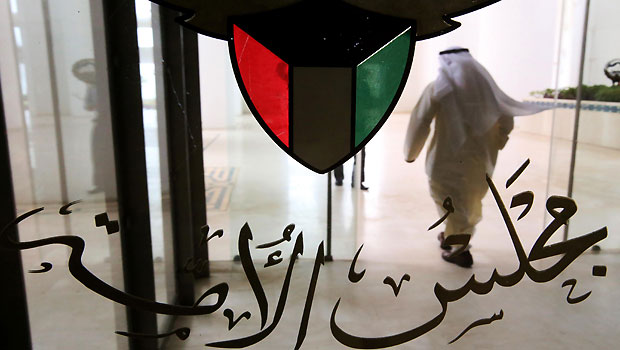
Kuwaiti Shiite MP Ahmed Lari leaves the national assembly in Kuwait City on June 16, 2013. (AFP/Yasser Al-Zayyat)
London, Asharq Al-Awsat—Kuwait’s Supreme Court dissolved the parliament on Sunday and called for new parliamentary elections to be held under a new voting system, in a move that will likely escalate the political standoff between the government and the opposition.
In a televised speech, Kuwait’s emir called on Kuwaitis to accept the changes to the voting system, urging them to reject “the voices of chaos.”
Sheikh Sabah Al-Ahmed Al-Sabah called on Kuwaitis “to respect [the Supreme Court’s decision] and abide by it.”
In an exclusive interview with Asharq Al-Awsat, Ali Al-Rashed, speaker of the dissolved parliament, said: “The court’s ruling proves that we live in a country that operates within the law. This is a source of pride for us. Irrespective of its content, whether we like it or not, everyone should commit to [the ruling].”
Rashed believes that the ruling will have positive influence on the political process in Kuwait by “giving the chance to a wide cross-section of society to participate [in the elections] and reconsider their decision to boycott.”
He confirmed that only a small section of society has announced they will boycott the next parliamentary elections, to be held within the next two months.
The majority of political factions, including the tribes, have announced their approval of the ruling and insisted on participating in the next elections, Rashed added.
He said: “The only factor that might reduce the rates of participation is the timing, not the boycott,” given that the elections will be held at a time when Kuwaitis usually travel abroad on summer holiday.
Rashed dismissed claims that the Supreme Court’s ruling will fail to de-escalate the crisis in Kuwait or that it will result in a parliament similar to the one that has just been dissolved. He emphasized that “this is something which depends on the Kuwaitis.”
He lambasted the performance of the government’s advisors, accusing them of escalating the crisis: “They offer useless advice that results in petty rules.”
The speaker of the dissolved parliament announced that the next government will likely not face a similar issue regarding the invalidation of election results.
Dr. Shafiq Al-Ghabra, professor of political science at Kuwait University, informed Asharq Al-Awsat that the Supreme court’s ruling established a common ground between the conflicting sides, although it did not solve the problems.
“Argument will rage in the coming period over programs of political reform, including laws authorizing parties, promoting freedom and developing the political process,” Dr. Ghabra said.
Commenting on the form of protests in the future, he said: “They will not be as they used to be in the past. By boycotting the elections, the opposition sent a message to the regime. However, the one-vote system persisted. This means that returning to the old method of boycotting [the elections] might not pay off.”
“The next parliament will be different from the current one. However, things are still unclear,” Ghabra added.
Kuwait’s opposition had boycotted previous parliamentary elections, held in December, and threatened not to participate in the next elections unless the country’s voting system is reconsidered. The Supreme Court’s decision on Sunday to hold new elections is considered a blow to the opposition’s calls for reform.
